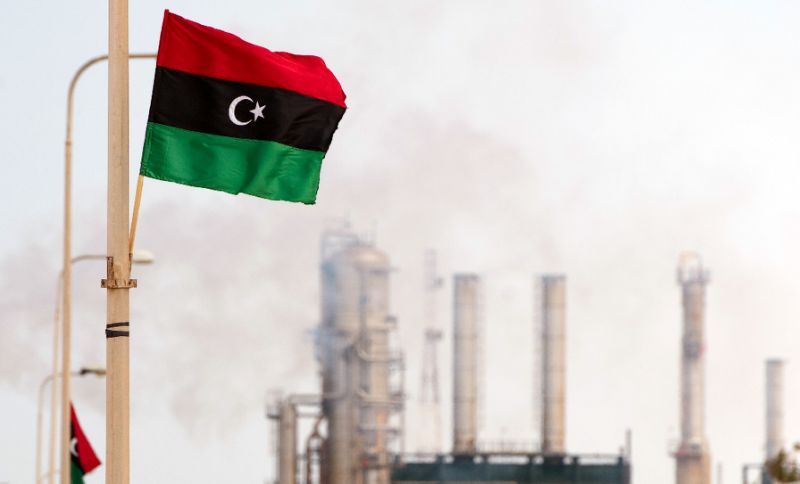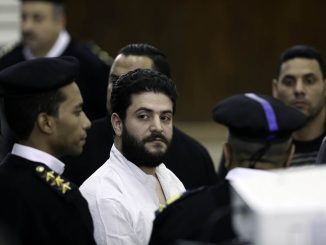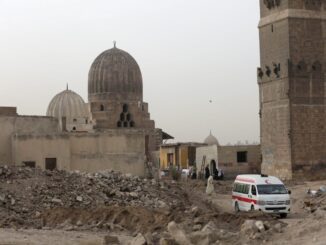
The Petroleum Facilities Guards (PFG) have regained control over Ras Lanuf oil terminal and the Gulf of Sidra after confrontations with the Libyan National Army(LNA) led by Gen.Khalifa Haftar who has controlled the oil Cresent eastern Libya recently, according to Al-Jazeera.
Al-Jazeera correspondent in Libya Mahmoud Abd al-Wahed said that the Petroleum Facilities Guards, led by Ibrahim al-Jadhran, are engaged in confrontations around the Gulf of Sidra after it controlled Ras Lanuf.
The spokesman of the Petroleum Facilities Guards Ali al Hasy said that air forces related to Haftar have launched air strikes on the gates of Ras Lanuf residential area. Aly al-Hasy said that fire has broken out in a warehouse at the Gulf of Sidra as a result of the confrontations that erupted this morning.
Al-Jazeera correspondent said that this development came after the Presidential Council assigned the Government of National Accord (GNA), backed internationally, to regain the oil terminals that were taken over by Haftar’s forces days ago, a step which was condemned by the international actors.
The Libyan National Army (LNA) led by Haftar had taken over oil facilities in eastern Libya from Petroleum Facilities Guards, a rival militia force allied to the UN-backed government in the capital, Tripoli.
Haftar is a military figure that is backed by the Tobruk government, based in eastern Libya and refuses to recognize the U.N.-backed government. He enjoys the support of several Arab nations, including Egypt, the United Arab Emirates, and Jordan, as well as western countries such as France.
Weeks ago, Haftar started extending his power in the east with the assistance of the Egyptian Armed Forces.
Egypt’s Armed Forces have been mandated to protect the joint borders from the sea to the Libyan-Sudanese borders.
Haftar requested the Egyptian army to protect Libyan/Egyptian borders from Imsaad, in the north, to the Libyan/Sudanese borders, as well as the maritime boundaries between both countries, “meaning that Haftar has granted Egypt unprecedented authority on Libyan territory,” said Libya Prospect.
Moreover, the oil tankers transporting Libyan petrol from Haftar-controlled regions in the east will be under Egypt’s authority in practice, the oil tankers will only be able to carry the oil and export unless Cairo approves.
With the assistance of the Egyptian Armed Forces, Haftar succeeded in controlling the oil terminals eastern Libya.He was also promoted by Tobruk House of Representative (HoR) as Field Marshall after he controlled the Oil Cresent eastern Libya.
Moreover, the legal adviser for the Army affiliated to General Khalifa Haftar and the Interim Government, Salah Abdul-Kareem, has stated earlier that Libya was ready to export the Libyan petroleum oil to Egypt for the Egyptian Pound to strengthen it in front of the foreign currencies.
Abdul-Kareem told an Egyptian TV channel that this was proposed to the Libyan House of Representatives (HoR), Oil Corporation, Interim Government, and the head of the Central Bank of Libya in Al-Baida, so Egypt doesn’t have to buy for the hard currency.
He stressed that Egypt must have benefited of the Libyan Oil.
Moreover, he also said that it was necessary to set up projects to link the Egyptian and Libyan peoples.
Abdul-Kareem confirmed once more that the army under the leadership of Haftar is working with Egypt, adding that the UN envoy to Libya, Martin Kobler is not welcomed in Libya.
Kobler, the UN envoy, has warned that Haftar’s control over the Oil Cresent in Libya will lead to more divisions among political factions in Libya, affect oil exports and deprive Libya of its only source of revenues.
During informing the Security Council with the latest developments in Libya, Kobler said that he tried to contact Haftar but his efforts have failed.



